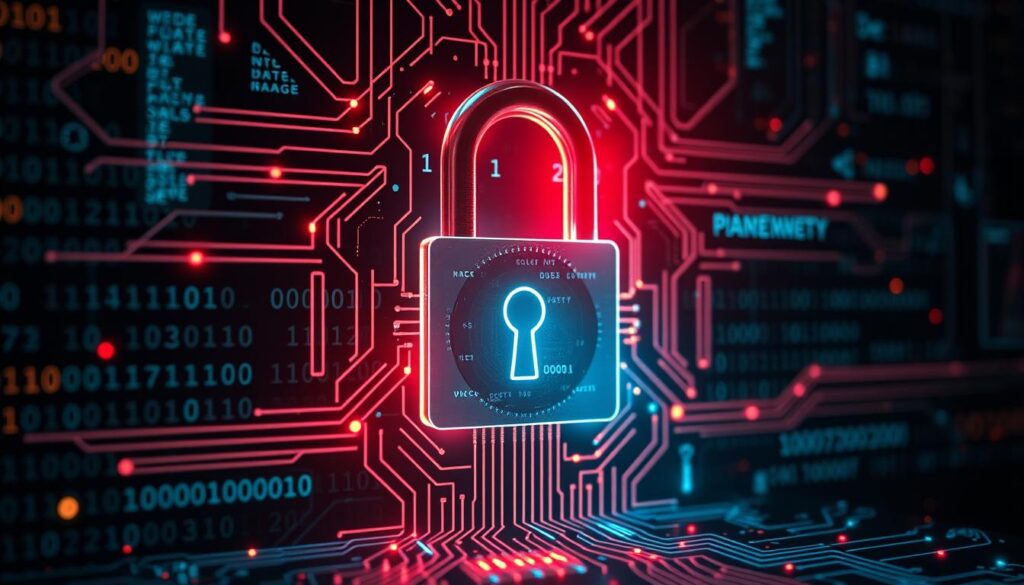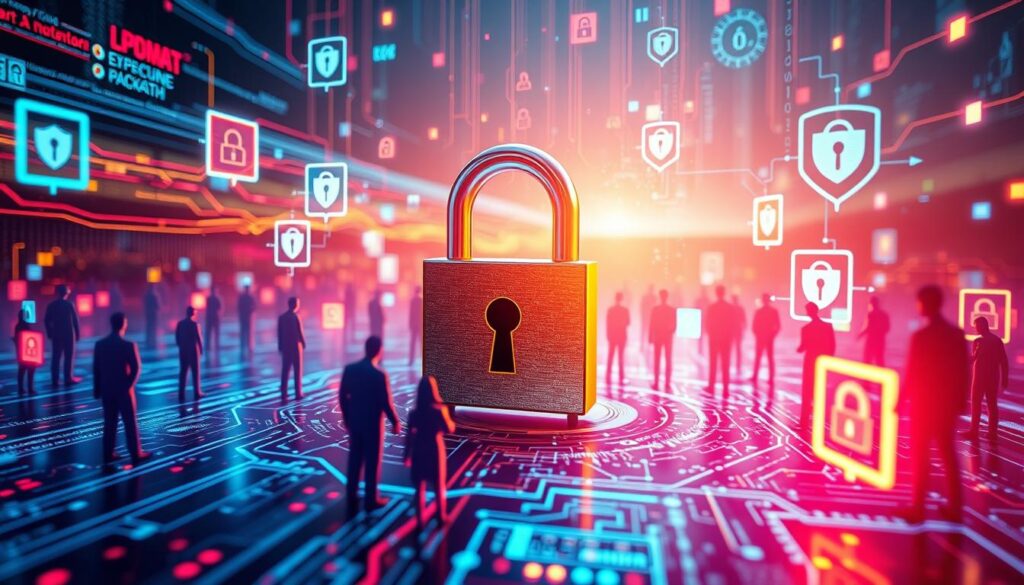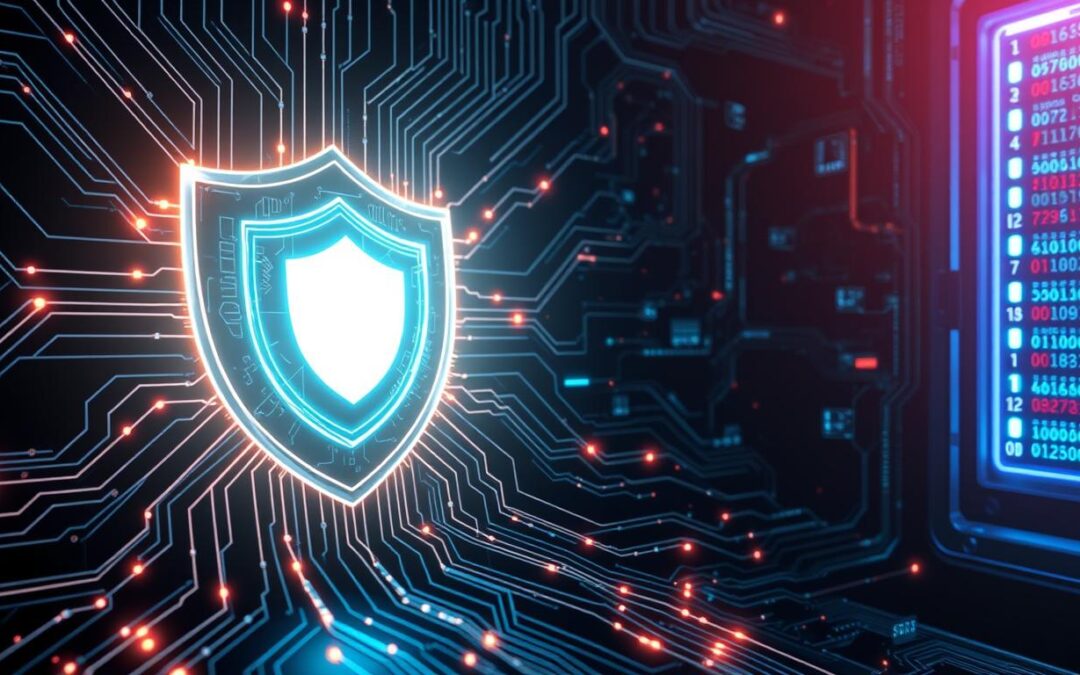In today’s world, keeping your digital life safe is key. With more online activities, the danger of cyber attacks grows. This makes keeping your online life and data safe very important.
Studies show that 95% of cyber breaches happen because of human mistakes. This shows how vital education and awareness are in fighting cyber threats.
Cybercrime is expected to cost the world $10.5 trillion by 2025. This highlights the big financial risks without good cybersecurity. Also, 60% of small businesses fail after a cyber attack, showing the need for strong defenses.
In 2020, cyber attacks jumped by 400%. This rise happened because of the COVID-19 pandemic and more people working from home. So, keeping your online life safe is now more important than ever.
Key Takeaways
- Cybersecurity is essential for individuals and organizations to protect themselves from cyber threats.
- Human error is the primary cause of cybersecurity breaches, emphasizing the need for education and awareness.
- Cybercrime is projected to cost the world $10.5 trillion annually by 2025, highlighting the financial risks associated with ineffective cybersecurity measures.
- Robust cyber defenses and data protection are critical for small businesses to prevent closure after a cyber attack.
- Cybersecurity incidents have increased dramatically, making online security a top priority.
- Effective cybersecurity measures, including online security and data protection, can help prevent cyber attacks and protect sensitive information.
Understanding Modern Cybersecurity Challenges
Cybersecurity is key to keeping data safe from unauthorized access. The threat landscape keeps changing, with new dangers popping up daily. Network security is vital to stop these threats from harming systems and data. IT security tools like firewalls and intrusion detection systems can block cyber attacks.
Common threats include phishing, ransomware, and social engineering. These attacks can be very costly, with the average data breach costing $4.24 million. To stay safe, it’s important to know about new threats and update security measures. This means using strong security protocols, like multi-factor authentication and regular audits.
Training employees on security is crucial to avoid human mistakes in cybersecurity. Teaching employees to spot and report security threats can greatly lower the risk of a cyber attack. Also, using a Zero Trust security model can help limit access to sensitive data and systems.
Essential Components of Digital Security
Internet security is key in our daily lives. Cyber defense is vital to fight off new threats. To keep digital security strong, we must secure devices, protect our online identity, and teach others about cybersecurity.
Securing devices is a big part of internet security. This means installing anti-virus software, using a firewall, and keeping software up to date. It also means using strong passwords and being careful with app permissions.
Learning and knowing about cyber threats is also important. We can do this by going to workshops, staying informed about security breaches, and spreading the word about digital security. These steps help lower the risk of cyber attacks and keep our information safe.
Some top tips for cyber defense are:
- Regularly update software and security patches
- Use strong passwords and two-factor authentication
- Be careful with app permissions
- Stay informed about security breaches and promote digital security awareness
By following these tips and focusing on digital security, we can keep our internet safe from threats.
Building Strong Password Practices
Creating strong passwords is key to cybersecurity and online security. It keeps your sensitive info safe from hackers. With more data breaches happening, it’s vital to have good password habits. In 2020, 81% of data breaches were due to weak or stolen passwords.
A good password is long, at least 12 characters. It should mix letters, numbers, and special characters. Using a password manager can help keep your passwords safe and unique. It makes your accounts much safer.
Password Creation Guidelines
- Use a mix of characters, numbers, and special characters
- Avoid using easy-to-guess info like names or birthdates
- Make sure passwords are at least 12 characters long

Multi-Factor Authentication
Multi-factor authentication (MFA) adds extra security to your online accounts. It asks for a second form of verification, besides your password. This makes your accounts much safer, with a 99.9% drop in unauthorized access.
Network Security Fundamentals
Securing home networks is key in today’s digital world. Information security threats are getting smarter. To fight these, use strong passwords, enable encryption, and keep firmware up to date. Also, a virtual private network (VPN) protects your online actions from being seen.
Monitoring your network is vital. It can catch threats before they happen. There are two ways to do this: agent-based and agentless. Agent-based gives detailed info on devices, while agentless checks connections and packets.
- Using strong passwords and multi-factor authentication
- Enabling encryption and regularly updating firmware
- Using a virtual private network (VPN) to protect online activities
- Implementing network segmentation to protect independent subnetworks
By following these steps, you can keep your home network safe. This ensures IT security for everyone.
Data Protection Strategies
As the digital world grows, internet security is more important than ever. With more cyber threats, it’s key to have strong cyber defense to keep data safe. Encrypting, storing, and backing up sensitive info are crucial steps in digital security.
Recent stats show the global cost to fix a data breach in 2023 was USD 4.45 million. This is a 15% jump from three years ago. It shows why strong data protection is vital to avoid such costs. Important strategies include:
- Encrypting sensitive data to prevent unauthorized access
- Storing data securely using secure servers and protocols
- Backing up data regularly to prevent loss in case of a breach
By using these methods, companies can keep their data safe. This ensures the confidentiality, integrity, and availability of their data. As one expert says, “Encrypting sensitive business data is a must these days. Even if a cybercriminal manages to get into your system, encryption ensures that the data is unreadable without the correct decryption key.”
Organizations also need to keep checking for new data risks. They should have clear rules for protecting private info. This helps them stay compliant with laws and keeps their internet security and cyber defense strong.
Social Engineering and Human Factor
Social engineering is when cybercriminals trick people into sharing secret info. They might pretend to be someone you trust. This can happen through emails, fake stories, or bait. It’s key to understand how important people are in stopping these tricks in cybersecurity.
About 90% of data breaches use social engineering. This shows we need strong online security and to teach people how to spot these tricks. It’s also crucial to have good data protection plans.

Companies can fight social engineering by teaching their teams about security. This training can cut phishing risks by 70%. It should teach how to spot phishing, use strong passwords, and be careful on social media.
- Being careful with emails is key to avoiding phishing.
- Teaching employees to spot and report social engineering is important.
- Keeping social media safe means using strong passwords and being careful with personal info.
By focusing on the human side of cybersecurity and using good online security steps, companies can lower the chance of social engineering attacks. This helps keep their data protection safe.
Mobile Device Security
Mobile devices are now a big part of our lives, making them a target for cyber threats. Information security is key to keep these devices safe from malware and phishing. Recent stats show mobile devices now lead desktops in web browsing, attracting cybercriminals.
To keep networks safe, securing mobile devices is vital. Use strong passwords, enable encryption, and update software and security patches often. Also, a virtual private network (VPN) can shield online activities from hackers. IT security steps like these can stop data theft and security breaches.
Some important stats to remember:
- 70% of organizations face security issues due to employee use of personal mobile devices at work.
- 60% of mobile malware is found in third-party apps.
- More than 80% of mobile users use public Wi-Fi, risking man-in-the-middle attacks.
By taking the right steps and using strong information security measures, we can protect our mobile devices. This means being cautious with public Wi-Fi and taking steps to stay safe. By focusing on network security and IT security, we can keep our mobile devices and data safe.
Advanced Cybersecurity Tools and Technologies
As threats grow, staying ahead with advanced tools is key. Internet security is crucial, and the right tools can be a game-changer. Options range from antivirus to security monitoring systems, all designed to fight cyber threats.
Cyber defense is vital, and the right tools can stop breaches. Firewalls, intrusion detection, and encryption are among the most effective. They shield against malware, phishing, and ransomware.
- Antivirus solutions to detect and remove malware
- Firewall configuration to block unauthorized access
- Security monitoring systems to detect and respond to security threats
Investing in these tools boosts digital security for both individuals and organizations. It helps protect against cyber threats.
Conclusion: Maintaining Long-term Digital Safety
Cybersecurity is key to protecting our digital world today. We must stay alert, update our defenses, and teach others to keep our data safe. The field of cybersecurity is booming, offering many jobs for those who want to help.
The threats we face online are always changing. But, we can fight back with smart security steps. Using strong passwords, multi-factor authentication, and keeping software up-to-date can greatly lower the risk of cyber attacks.
It’s important to use the newest cybersecurity tools and teach everyone about online safety. By doing this, we can all feel more secure in our digital lives. This way, we can confidently move forward in today’s digital world.

